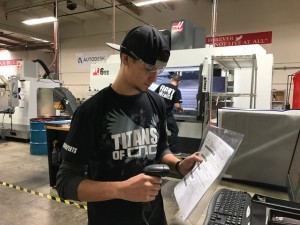Perfect Documentation
Why elite machine shops have to prove their ability to manage design changes
Quick: what’s the most important part of elite high-speed manufacturing? Is it running as fast as possible? The ability to make anything the customer needs? Next-level fixturing?
The answer Titan Gilroy gives might surprise you. It’s (yawn) documentation.
“Our shop has to make anything and everything,” Titan says. “When a customer comes up with a new design, whether it’s in aerospace, or medical devices, or sub-sea exploration, we can do it,” he says. “But the easiest way we can get into trouble is by not having our documentation in order.”
This is another way of saying that when it’s your job to make things, it’s really important to be confident you’re making the right things. If that’s not the case, it means your quality is failing. It means the spindle is turning, but you’re making parts that are going to get rejected.
“Keeping customers happy is essential for getting the work,” Titan says. “You have to prove you can follow through on what the customer tells you to do. You can’t make good parts if you have the wrong design. That means all the material you purchased, all the outside processing you paid for, you’re going to have to eat those costs. And that puts you out of business.”
Managing solid models, drawings, documentation — and, most important, customer changes to all of these — is the most important capability a shop can build. Without it, shops will not be able to achieve the ISO or AS9100 quality standards that many top-flight customers require.
“That’s the first thing elite companies look at,” Titan says. “Not your capability, but your traceability. Your ability to detect and fix mistakes. Your ability to follow through on changes so everyone knows exactly what to do and the process can’t fail. And your ability to prove that you can do it. That’s the only way elite companies will give you the work. They don’t take chances.”
Titan’s shop has numerous redundant processes in place to make sure these “rev changes” from customers are handled properly.
The first is a customer audit, during which a team of representatives from the customer’s organization visit the shop to see first-hand what processes the shop uses to control rev changes and contract review. All of this is handled by Travis Jarrett, production supervisor for the shop.
“Whenever the customer sends a revision, we go through the entire contract review process, from scheduling to engineering to inspection of the new drawing,” Travis says. “Even if it’s just a radius change, we perform our due diligence and get signatures on our documents at each stage.”
Documents that are changed must be stamped before they reach Titan’s shop floor. If a drawing was changed and doesn’t have the stamp, it is not released to the floor for a run. In addition, the shop has a separate process for removing the old drawing from the server so that a machinist can’t even choose it accidentally. All of these changes are tied into the shop’s ERP system, and all documents are bar coded for easy tracking.
If you think this sounds like overkill for something that doesn’t happen very often, think again.
“We get rev changes constantly,” Travis says. “Customers are focused on continuous improvement. They are always seeing how they can make parts better. It’s a daily part of our operation. Customers need to have the confidence that a shop has the systems in place to handle this.”
You might also think that these processes only apply to super-expensive, high-end parts that cost millions to produce. Again, this simply isn’t true.
“I’ve seen cases where a $200 part can shut down the entire assembly of a $400 million rocket if it’s not made correctly,” Titan says. “If your documentation isn’t perfect, you can have a catastrophic failure at the time when your customer needs their parts most. Their workers are standing around because you failed to control documentation. This is one of the most serious parts of what we do.”
Sure, risk mitigation isn’t the most exciting topic. It’s not as satisfying as high-speed feeds, chips flying, and cutter-paths producing perfect parts. But it’s just as vital.
“You earn the customer’s trust when you make their life easy,” Titan says. “The one thing you can’t do is add risk. The customer needs you to show absolute control over the process. Handling rev changes perfectly is the only way to do that, because it prevents a long list of other problems.”



